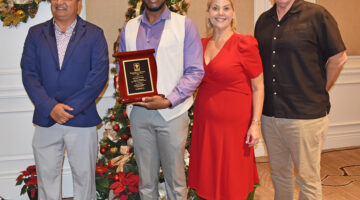Business Law 101 / Criminal Intent
By Albert L. Kelley
I have been writing this column for several years now and the one topic I have pretty much avoided is criminal law. There are two reasons for this: 1) this is a column about business law; and 2) I’m not a criminal defense lawyer. However, businesses and their owners do get charged with crimes, and through the years, not only have I studied criminal law, I’ve handled a few cases on both sides (prosecution and defense) and even taught college courses on criminal justice-correctional systems.
“When we talk about criminal law, there are actually two components: crimes and procedure. “Crimes” is a big topic. The Florida statutes have 46 chapters covering 300 pages dedicated to defining crimes. Many of these chapters cover multiple crimes. And each of these crimes have specific definitions that can change their degree.
Crimes can be divided into many types of categories. One way is by the lawbreakers intent. Crimes can be divided into General Intent, Specific Intent and Strict Liability crimes. General Intent means merely that the lawbreaker intended to take an action that was in violation of the statutes. Specific Intent means that not only did the lawbreaker intend to take an action that was in violation of the statutes, but they intended a specific outcome from their actions. Strict Liability requires no intention but merely requires the state to prove the lawbreaker took action in violation of the law. To understand this concept better, let’s look at some examples.
Crimes classified as strict liability include statutory rape (the lawbreaker, or defendant, may be deemed guilty of having sex with an underage person even if they believed the person was over the age of consent and even if the person provided ID showing they were over the age of consent), DUI (the lawbreaker may be deemed guilty of DUI even if they believe there were not under the influence), selling alcohol to an underage person (the lawbreaker can be arrested even if the underage person presented identification showing they were over the age of 21), driving with expired tag, and possession of illegal drugs (the lawbreaker can be deemed guilty even if they were not aware the drugs were illegal). There are also many regulatory crimes and traffic crimes that are deemed strict liability.
Crimes classified as general intent include manslaughter (where a person took an action- usually a battery- that led to another’s death without the intent that the action would lead to the death), arson (the state need only prove the person intended to start a fire, not that the fire would burn down a particular structure), rape (the state need only prove the intent to have sex. The intent that it be nonconsensual is not required).
Crimes classified as specific intent include first-degree murder (the lawbreaker must specifically intend to kill the victim), assault (the lawbreaker must specifically intend to cause harm to the victim), attempted crimes (attempted theft, attempted murder, attempted battery-all require the intent to commit a crime), burglary (burglary involves the breaking into a building with the specific intent to commit a crime-theft, assault, etc.), forgery (presenting a falsified document with the specific intent to defraud a person), conspiracy (requires a specific intent to commit a crime), and solicitation (enticing another person to commit a crime).
Al Kelley is a Florida business law attorney located in Key West and previously taught business law, personnel law and labor law at St. Leo University. He is also the author of four law books: (“Basics of Business Law” “Basics of Florida’s Small Claims Court”, “Basics of Florida’s Landlord/Tenant Law” and “Basics of Starting a Florida Business” (Absolutely Amazing e-Books)). This article is being offered as a public service and is not intended to provide specific legal advice. If you have any questions about legal issues, you should confer with a licensed Florida attorney.
[livemarket market_name="KONK Life LiveMarket" limit=3 category=“” show_signup=0 show_more=0]






No Comment